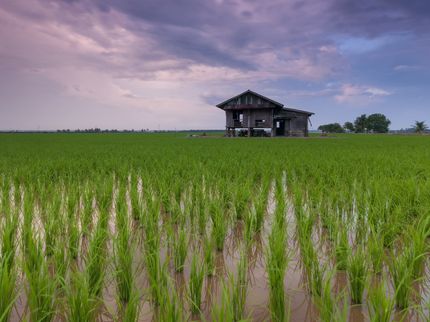Drought-tolerant cowpea can improve crop yield in arid West Africa
Advertisement
Even the highly drought-resistant cowpea (a long type of legume) now has an increasingly difficult time surviving in the Sahel countries where climate change has resulted in shorter and less frequent rainy seasons. Wageningen University scientist Eugene Agbicodo, working on a Lukas Brader fellowship at IITA and Wageningen University, recently localised genes of the cowpea that contribute to an improved drought tolerance. This will help breeders and farmers to produce crops with higher yields despite the changing climate.
In cooperation with research institute IITA, Agbicodo performed tests in Nigeria with a drought-sensitive type and a drought-tolerant type of cowpea and 120 offspring of a cross-breed of the two. By comparing the DNA from the offspring that did poorly with those that did well, he traced the location of the drought-tolerant characteristic on the cowpea chromosome. Agbicodo also established that plants with leaves that age slower and stomata that stayed open longer had a higher legume and seed yield.
Cowpea is often one of the few crops that produces anything at all in drought-stricken areas with barren soil. In addition, the plant improves the soil's fertility because of its excellent nitrogen-fixing abilities. Cowpea is a traditional crop that is cultivated on small farms and not economically viable for large corporations. This is why there has been very little detailed research into the crop. But that is now changing. Led from the United States and subsidised by the Bill & Melinda Gates Foundation, a research programme has been established via the Generation Challenge Program (GCP) to acquire more knowledge about the cowpea and increase the yield of the crops.
The close cooperation between scientists from Wageningen University, IITA and the scientists in the GCP program of the University of California (Riverside, USA) resulted in the localisation of genes that stimulate drought-tolerance in various types of cowpea. T
Most read news
Organizations
Other news from the department science

Get the life science industry in your inbox
By submitting this form you agree that LUMITOS AG will send you the newsletter(s) selected above by email. Your data will not be passed on to third parties. Your data will be stored and processed in accordance with our data protection regulations. LUMITOS may contact you by email for the purpose of advertising or market and opinion surveys. You can revoke your consent at any time without giving reasons to LUMITOS AG, Ernst-Augustin-Str. 2, 12489 Berlin, Germany or by e-mail at revoke@lumitos.com with effect for the future. In addition, each email contains a link to unsubscribe from the corresponding newsletter.


























































